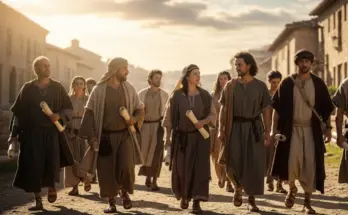Have we ever truly paused to consider what happens when a mortal glimpses the holiness of God? In Isaiah chapter 6, we step into one of the most breathtaking scenes in all of Scripture. Isaiah doesn’t just hear from God, he sees Him. The veil is pulled back. The temple shakes. Angels cry out. Smoke fills the room. Suddenly, we’re not just reading, we’re standing with Isaiah, trembling before a throne of unmatched majesty.

ESV Study Bible
The ESV Study Bible was designed to help you understand the Bible in a deeper way. Created by a diverse team of 95 leading Bible scholars and teachers―from 9 countries, nearly 20 denominations, and 50 seminaries, colleges, and universities. Get Yours on Amazon
Yet, this chapter isn’t only about awe and wonder. It’s also about cleansing, calling, and surrender. Isaiah’s unclean lips are touched with fire. Then, God asks a haunting question: “Whom shall I send?” And Isaiah responds with courage: “Here am I. Send me!“
As we walk through this outline, let’s allow the weight of God’s holiness to shape us. At the same time, let’s not miss the grace that meets us in our undone moments.
Isaiah chapter 6 reminds us that God still calls. He still cleanses. And He still sends ordinary people into extraordinary assignments.
Isaiah’s Vision of the Lord (Isaiah 6:1–4)
1 In the year that King Uzziah died I saw the Lord sitting upon a throne, high and lifted up; and the train of his robe filled the temple. 2 Above him stood the seraphim. Each had six wings: with two he covered his face, and with two he covered his feet, and with two he flew. 3 And one called to another and said: “Holy, holy, holy is the Lord of hosts; the whole earth is full of his glory! ” 4 And the foundations of the thresholds shook at the voice of him who called, and the house was filled with smoke.
Isaiah chapter 6 opens with one of the most majestic scenes in Scripture. “In the year that King Uzziah died I saw the Lord sitting upon a throne, high and lifted up; and the train of his robe filled the temple” (Isaiah 6:1). The death of a long-reigning king marked a turning point for Judah. At this moment, Isaiah was given a vision of the true King. The contrast is striking: the earthly throne stood empty, but the heavenly throne stood occupied by the eternal Lord.
Isaiah describes seraphim, fiery angelic beings, surrounding the throne. Each had six wings, with two covering the face, two covering the feet, and two used for flight (Isaiah 6:2). Their posture revealed humility and reverence in the presence of the Almighty. They called out to one another, saying, “Holy, holy, holy is the Lord of hosts; the whole earth is full of his glory” (Isaiah 6:3). The triple declaration of holiness stressed God’s complete separation from sin and His perfect purity.
The very foundations of the temple shook at their voices, and smoke filled the sanctuary (Isaiah 6:4). The imagery communicates the overwhelming majesty of God’s presence. This vision reminded Isaiah, and us, that God rules supreme above all earthly powers. It also reveals the holiness of God as the central reality of His nature. In the face of this vision, no human can remain neutral. The scene sets the stage for Isaiah’s own personal response, which follows in the next verses.
Isaiah’s Confession & Cleansing (Isaiah 6:5–7)
5 And I said: “Woe is me! For I am lost; for I am a man of unclean lips, and I dwell in the midst of a people of unclean lips; for my eyes have seen the King, the Lord of hosts! ” 6 Then one of the seraphim flew to me, having in his hand a burning coal that he had taken with tongs from the altar. 7 And he touched my mouth and said: “Behold, this has touched your lips; your guilt is taken away, and your sin atoned for. ”
Confronted with the holiness of God, Isaiah was undone. He cried, “Woe is me! For I am lost; for I am a man of unclean lips, and I dwell in the midst of a people of unclean lips; for my eyes have seen the King, the Lord of hosts” (Isaiah 6:5). In Isaiah chapter 6, this confession is not mere humility. It is the recognition of sin when measured against God’s holy standard. To see God’s glory is to recognize human impurity.
Isaiah especially mentioned his lips. As a prophet, his calling was tied to words. Yet he realized that even his speech, meant to serve God, was corrupted. This truth cut deep, since the prophet’s mouth should be the vessel of God’s message. His sin was not only personal but also tied to the nation. He was part of a people who shared the same guilt.
In response, one of the seraphim flew to him with a burning coal taken from the altar (Isaiah 6:6). The coal touched Isaiah’s lips, and the angel declared, “Behold, this has touched your lips; your guilt is taken away, and your sin atoned for” (Isaiah 6:7). This action symbolizes cleansing by fire. The altar represents sacrifice, pointing ahead to Christ’s ultimate atonement.
Discover simple, powerful Bible study habits—order How to Study the Bible for Yourself today!
Isaiah’s experience reminds us that forgiveness begins with confession. God initiates cleansing through His provision. The prophet’s lips were purified so that his words could be used in service. Without this cleansing, Isaiah could not speak on God’s behalf. Forgiveness and commissioning always go together in God’s plan.
God’s Call and Isaiah’s Commission (Isaiah 6:8–10)
8 And I heard the voice of the Lord saying, “Whom shall I send, and who will go for us? ” Then I said, “Here I am! Send me.” 9 And he said, “Go, and say to this people: “‘Keep on hearing, but do not understand; keep on seeing, but do not perceive. ’ 10 Make the heart of this people dull, and their ears heavy, and blind their eyes; lest they see with their eyes, and hear with their ears, and understand with their hearts, and turn and be healed. ”
After Isaiah’s cleansing, he was ready to hear God’s call. The Lord asked, “Whom shall I send, and who will go for us?” (Isaiah 6:8). The question was not because God lacked messengers. Rather, it gave Isaiah the opportunity to respond with willingness. The newly cleansed prophet answered, “Here I am! Send me.” His response shows eagerness born from grace received. He had no excuses, only readiness.
God’s message, however, was sobering. The Lord commanded Isaiah to deliver a word that would harden rather than soften hearts (Isaiah 6:9–10). The people would “hear but not understand” and “see but not perceive.” This paradox highlights the mystery of judgment. God’s Word never fails, but those who continually reject truth become further blinded by it. Rebellion hardens into spiritual deafness.
This commission shows the seriousness of Isaiah chapter 6. The prophet was not called to popularity or ease. His preaching would expose sin and confirm judgment. Yet he was still called to speak faithfully. The results belonged to God.

Jesus The Way, Truth and Life Peel & Stick Christian Quotes
Our decals are proudly manufactured in the United States, ensuring a product of the highest quality. Made and printed with the finest craftsmanship, exceptional durability and longlasting aesthetics. Get Yours on Amazon
For us, this section teaches that calling is not about personal comfort. God sometimes calls His servants into hard assignments. Our task is obedience, not results. When hearts resist, the Word still accomplishes God’s purpose. Isaiah learned that his voice would ring out against stubbornness, but he obeyed. God’s holiness demands that His truth be declared, whether people listen or not.
Length & Purpose of the Judgment (Isaiah 6:11–13)
11 Then I said, “How long, O Lord? ”And he said: “Until cities lie waste without inhabitant, and houses without people, and the land is a desolate waste, 12 and the Lord removes people far away, and the forsaken places are many in the midst of the land. 13 And though a tenth remain in it, it will be burned again, like a terebinth or an oak, whose stump remains when it is felled. ” The holy seed is its stump.
Isaiah naturally asked how long this judgment would last. He said, “How long, O Lord?” (Isaiah 6:11). God replied that the devastation would continue “until cities lie waste without inhabitant, and houses without people, and the land is a desolate waste” (Isaiah 6:11). The judgment would strip the nation until very little remained. The people would be removed far away, and only a small remnant would survive (Isaiah 6:12).
Yet even in this bleak prophecy, hope shines. God compared the remnant to a terebinth or oak tree that, when felled, leaves a stump (Isaiah 6:13). Though judgment would be severe, a holy seed would remain in the stump. This imagery points toward the promise of new growth. Out of devastation, God would bring renewal. Ultimately, this points to the coming Messiah, the holy seed who would rise from Israel’s line.
Isaiah chapter 6 closes with this tension. Judgment is real, because God’s holiness cannot ignore sin. Yet mercy is also real, because God preserves a remnant for His purposes. The holy seed ensures that God’s plan will not fail. The prophet’s difficult message contained both devastation and hope.
This final section teaches us that God’s judgment is not meaningless. It has purpose, pruning His people and preserving His promise. The remnant theme appears throughout Isaiah, reminding us that God always keeps His covenant. Even when everything seems lost, He preserves His people for future restoration. In God’s plan, hope survives the fire of judgment.
Closing Thoughts on Isaiah Chapter 6
Isaiah chapter six invites us to stand in awe of God’s holiness and respond with humble surrender. Isaiah’s vision wasn’t just for him—it’s for us. When we see God rightly, we see ourselves clearly. Yet, through cleansing and calling, He doesn’t leave us where He found us.
This chapter challenges us to listen, repent, and answer God’s call with bold faith. Though the message may be hard, God’s purpose is always redemption. Even when judgment falls, a holy seed remains. Hope is never lost.
Let’s not walk away unchanged. Take time to meditate on Isaiah chapter six this week. Reflect on what God is revealing to you through these verses.
Let His Word shape your thoughts, soften your heart, and ignite your calling. God still speaks from the throne. Are we listening?
For more outlines to guide your study, visit our Chapter Outlines page today. Don’t delay—dig deeper into God’s Word and discover fresh wisdom for every season of life.
Let’s pursue truth, trust His voice, and walk boldly in His purpose. The time to respond is now.
Discover More in Bible Study Toolbox
Looking for more? Explore additional Old Testament Bible Outlines to see how God’s Word fits together chapter by chapter. Each outline is part of the resources available at Bible Study Toolbox, where we provide studies, guides, and tools to help believers grow in the Word with clarity and confidence. Contact us with any questions or concerns.
Frequently Asked Questions (FAQ)
1. What is the main message of Isaiah chapter six? Isaiah chapter six reveals God’s holiness, Isaiah’s cleansing, and his prophetic call. It emphasizes God’s glory, judgment, and ultimate hope.
2. Why is Isaiah’s vision in the temple so significant? The vision shows God’s majesty and holiness. It marks the moment Isaiah is transformed and commissioned to speak God’s message.
3. What do the seraphim represent in Isaiah chapter six? The seraphim symbolize purity, worship, and the overwhelming presence of God. Their cry, “Holy, holy, holy,” highlights God’s absolute holiness.
4. What does the burning coal symbolize in Isaiah’s cleansing? The coal from the altar represents divine purification. It shows that God alone can cleanse and prepare us for His service.
5. How can we apply Isaiah chapter six to our lives today? We can respond to God’s holiness with humility, receive His cleansing, and boldly answer His call to serve in our generation.



